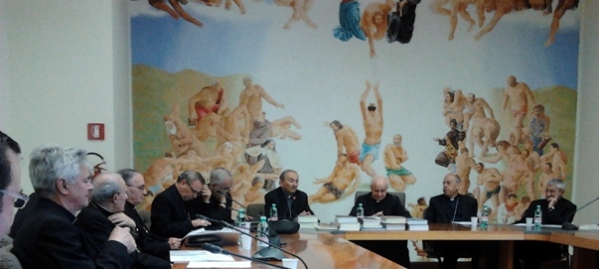The Bishops of the Puglia region on their ad limina visit to the Pontifical Council for the Family

The Pontifical Council for the Family received the Bishops of the 18 Dioceses of Puglia for their ad limina visit, on May 13th,. Thirteen Bishops were present. After a moment of informal greetings and a cordial welcome, S.E. Msgr. Paglia expressed his desire to hear primarily the Bishops share news and assessments concerning the pastoral care of the family and life in their region. Beforehand, the Secretary of the Bishops of Puglia, S.E. Msgr. Michele Castoro, Archbishop of Manfredonia-Vieste-San Giovanni Rotondo, had sent a summary sheet on family ministry in Puglia to our Dicastery (
Link to the document).
On behalf of all, H.E. Msgr. Francesco Cacucci, Archbishop of Bari-Bitonto and President of this Conference spoke, recalling how the family ministry in this Region was started many years ago, and that since then Puglia has been active and somehow leading in the creation and development of Centers of support for life as well as in the theological and pastoral work, which brought the Italian Bishops’ Conference to dote itself with a Directory of family ministry in 1993. In Puglia, at the outset, the regional commission was established, which then in union with the others formed the National Council of Family Ministry, and hence also constituted the first nucleus of the Forum of Family Associations. All of these initiatives were been made possible thanks to the generous and decisive contribution of lay people, couples and volunteers. Truly, the family has shown, in various areas, that it is the frontier between the Church and civil society and the Consultants, a place open to all and capable of cooperating with civil institutions. Precisely in Puglia, the regional office of family ministry continues to be an unavoidable point of reference and a support for the relations of the individual dioceses with their respective Provinces, as well as with the whole Region.
In their numerous interventions, the Bishops have expressed concern about the many problems that deeply affect and damage families. If the care for the family comes first in the Church’s ministry, much still needs to be done so that the family may express its own truth as a place of relationships and personal enrichment, and overcome the many causes that often make it into a place of suffering, tears and even violence. The health —and the illness— of the family is the same as that of the entire society, since the family is its fundamental cell.
Among the requests made to the Dicastery figures the cultural study of emerging and culturally pervasive issues: gender theory, new situations of young people (the increase in cohabitation before marriage) and of the couple (separation, divorce, new unions, situations of children of separated couples, etc.). The Church must use simple, unambiguous language, also in order to avoid creating confusion and disorientation.
We must encourage the request of many couples who are preparing for marriage, so that they may experience not only a preparation course, but progress in the true journey of faith, which is the best guaranty for the life of couples and families. Likewise, on the social level, every effort must be made to help the maturation of consciences, by expanding the horizon of the reasons for the family, against the domination of ideology as well as individualistic and relativist tendencies.
The family remains essentially a great opportunity for the Church, as the primary subject of evangelization, and for society, as an irreplaceable and universal resource.